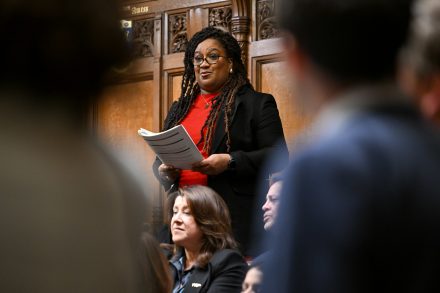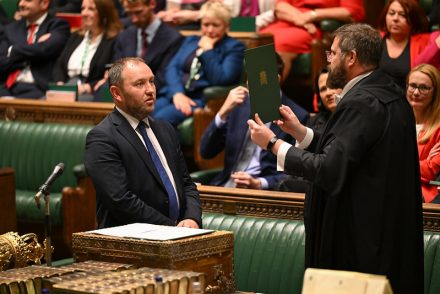“You should not believe anyone… who says they are not ambitious about the top job.”
Some will find Shabana Mahmood’s recent comments admirably frank. But colleagues might not thank her for perpetuating the idea their careers boil down to the greasy pole.
The Labour deputy leadership election – for a high-profile but undefined role with little formal power – throws up interesting questions. Why do politicians really do it? And is the prize worth the pitfalls?
LabourList spoke to over a dozen candidates or campaign teams past and present to unpick the intriguing, varied reasons candidates actually run – and why so many more don’t.
‘Standing cleared out my savings’
Stella Creasy in Bridgwater #Stella4Deputy http://t.co/Lx7biwj3QC pic.twitter.com/KyvJeV2Xxm
— Bridgwater Labour (@bridgwaterlab) July 27, 2015
“Someone asked: ‘Have you got a body in there? I spent the summer campaign lugging round this suitcase full of equipment, and catching lifts off people.”
Stella Creasy, who stood in 2015, explains: “I didn’t have big backers, so I cleared out my savings. We have to look at accessibility.”
Let’s start with the reasons not to run. Firstly, aspiring candidates know they’ll need to raise funds within days for access to membership data, plus promotional content, events, travel and ideally staff and offices. This year’s spending limits partly helped, but pose their own issues.
Running was ‘one of my biggest mistakes’
“We’ve been totally belt and braces, relying on great volunteers,” a source on Lucy Powell’s campaign says. Then there’s building apparatus from scratch. “It’s so quick and short, you lay the track as you go along.”
Organising people to lead operations, media, digital, field and fundraising work overnight is a “huge logistical challenge”, notes Alan Roden, who worked on Ian Murray’s 2020 bid.
Another 2025 campaign source says it started with “lots of people running in lots of directions” before things clicked, calling it “one of the most intense periods for anyone”.
READ MORE: Phillipson vows new measures to make members’ voices heard at cabinet
Phillipson is juggling her cabinet role, too. Peter Hain calls running in 2007 alongside two cabinet posts “one of the biggest mistakes” he made in politics. Simultaneously handling power-sharing negotiations in Northern Ireland and Welsh devolution, he “didn’t keep enough focus on the campaign”.
Previous, longer campaigns posed further headaches. “There were hustings in different parts of the country every week,” Rosena Allin-Khan says of the 2020 contest. “It works well for energetic people like myself, but it’s relentlessly exhausting.”
Colleagues ‘scathing’ and ‘want to back winners’
On #Marr recently, I set out my stall to become Labour’s Deputy Leader.
I’m the underdog – I have been my whole life, but a poll released on Friday shows that I’m gaining ground.pic.twitter.com/sr9bG04Z71
— Dr Rosena (@DrRosena) March 11, 2020
The first formal hurdle though is nominations. Richard Burgon, who stood in 2020, argues the doubling of the threshold to 10% of MPs in 2021, and the mere week MPs had to reach it, are a major deterrent to stop the left. He claims Bell Ribeiro-Addy may have progressed with the old rules and a longer window.
Some would-be candidates were deterred because “they thought it’d be so managed, it’d be impossible to get multiple candidates not backed by Downing Street on the ballot”, according to 2007 contender Jon Cruddas.
Many MPs wanted “brownie points voting Bridget,” one rival campaign source claims. Eighty-five MPs curiously didn’t nominate at all.
Aspiring candidates know colleagues “want to back winners, or someone likely to do well against them”, a past campaign staffer notes.
Many MPs reportedly said privately they’d support one 2025 candidate if they reached a public “critical mass”, but they never did. MPs “don’t want to look stupid”, a source on their campaign said.
Wooing colleagues is exposing, too. “Some were scathing, especially if trying to put you off,” one campaign aide recalls.
“You have to be mature,” Creasy adds. “If you held a grudge you’d never speak to anybody again.”
A second formal hurdle is affiliate endorsements, and the sense some are pre-ordained. Some panels can feel like job interviews where you realise an internal candidate’s got the role, Creasy recalls.
‘Women seen as self-promoters’

Women face more particular obstacles. “Men are seen as healthily ambitious, women as self-promoters. It’s like ‘how dare she’”, says one former candidate.
Creasy adds: “I was talked about as a girl – I was about 38. I’ll recognise we’ve started to equalise women’s voices when I stop being told I’m attention-seeking – let alone colleagues of colour or disabled colleagues.”
Former deputy leader Harriet Harman notes “progress” in this year’s all-women contest, however, noting the “self-denying ordinance” among aspiring male contenders who knew “the party is no longer okay with men-only leadership teams.”
An arduous job?
Any candidate knows the “scrutiny, attacks and work-life balance” challenges continue once elected, a former campaign aide notes.
One insider said potential candidates would reflect on “what happens to women in the media, and what happened to Angela”, as well as safety questions. Another insider said press intrusion had been “really difficult” for Rayner, as well as the “general stress, pressure and unrealistic expectations”.
Matthew McGregor, who ran Cruddas’ campaign, calls the job itself “arduous”, with the deputy countless people’s “port of call” for campaign days and fundraisers.
READ MORE: Challenge, responsibility and speaking truth to power– an interview with Lucy Powell
The lack of job description is a challenge, with no powers beyond sitting on Labour’s ruling body, and being consulted “regularly” by, and covering for, the leader.
Some leaders can try and “put you in a box and wheel you out for display” as few like having deputies elected on independent platforms, one insider suggested.
They were surprised the role wasn’t scrapped at conference, though the now-occupied deputy prime minister role curtails it. One former campaign staffer says it will be party-focused, deterring some “top-tier” aspiring politicians. “If you want government influence, you know it’s not the job it was under Angela.”
But campaigns are fun too.

There are many more reasons candidates do run, though.
Campaigns aren’t just bruising, for one. Virtually everyone interviewed relished engaging with so many members. Creasy calls it “incredible”.
Allin-Khan says she had “lots of fun”, making new friends.
Spending so long travelling to and backstage at hustings together quickly thaws the ice between campaigns too. “It was friendly, relaxed and we’d all have jokes. You wouldn’t guess who got on best backstage,” one recalls.
This year saw far fewer hustings, but Ribeiro-Addy calls it “quite collegiate”, adding: “Maybe because it was all women.”
Harman says she specifically told her team not to brief against rivals in 2007. “Everybody felt very strongly the contest shouldn’t be a destabilising force.”
Candidates’ real ambitions
More fundamentally, “personal ambition is one factor, but I don’t think the major one,” says Hain. “Everybody enters because they think they can make change for the better, including both candidates now.”
Inevitably bids are met with cynicism about motives, from Powell’s potential bitterness at dismissal to Phillipson’s potential desire to prevent the same (long-briefed) fate – or build for a future leadership bid.
But even an aide on a rival campaign believes Phillipson and Powell are running mainly as they’ve “got something to say about where the government is or should be”.
Angela Rayner is elected deputy leader of the Labour Party #LabourLeadership https://t.co/PVCHRWOS46 pic.twitter.com/uCVO0zVfzU
— BBC Politics (@BBCPolitics) April 4, 2020
Rayner similarly ran from “duty to do her bit rebuilding the party”, one insider suggests.
Cruddas also says Labour does need as many “ambitious prospective leaders as possible”, provided they show their “political philosophy and purpose”.
Another former candidate suggests it’s often as simple as “career progression” rather than prime-ministerial ambition.
A platform deputies can mould in their image
The role’s ambiguity is not necessarily negative, too, with candidates sensing they can make it their own. Most politicians want to be listened to, and it offers a “platform to be heard”, in cabinet or not, McGregor notes.
Passionate views on membership are often central.
Creasy wanted to use it to shift focus towards community organising and movement-building. Allin-Khan wanted to promote her “grassroots revival plan”. Burgon wanted to act as “guarantor” of members’ and MPs’ rights.
Hain wanted to reconnect with the grassroots, and says Powell does too.
READ MORE: Unity, pride and beating Reform – an interview with Bridget Phillipson
Powell’s talk of being a “shop steward” for MPs would continue an under-reported aspect of her former cabinet post as Commons Leader.
Encouragement from colleagues isn’t always the fig leaf for ambition it seems.
“She’s doing it for everyone who asked her, rather than herself,” a source on her campaign says. They describe how nice messages on her dismissal “quickly turned into questions of whether she’d stand”, adding: “It kind of just happened, and once that train started, there was no stopping it.”
Meanwhile Phillipson was reportedly urged to run by some new intake MPs, sensing she’d be more independent-minded than a potential “Number 10 stooge”, one insider claims.
Subscribe here to our daily newsletter roundup of Labour news, analysis and comment– and follow us on Bluesky, WhatsApp, X and Facebook.
Flying the flag – or fighting the boys’ club
Candidates don’t necessarily run to win, however.
Standing alone can raise the profile of lesser-known MPs, but many simply want to raise the profile of issues.
Few would say Cruddas ran to win, and he reportedly cheered Harman’s victory. Gordon Brown’s coronation made 2007’s deputy election “the only avenue for a discussion of Labour’s direction”, he says, and he tried to highlight social housing, flatlining wages and traditional voters’ disillusion.
Ribeiro-Addy wanted to not only champion members, but “prove there’s a strong progressive base within the party”.

Murray wanted to make sure “Scotland was part of the debate”, says Roden, while Harman says she only entered as she “couldn’t bear the idea of an all-male beauty contest”. That was about “extending the party’s reach”, too. Many would say the same of today’s widespread desire for another northern woman.
Then there’s the desire to “fly the flag for the tradition I come from”, as Burgon puts it , with the Socialist Campaign Group always fielding candidates.
The sense “the flame has to be kept alight” extends across the party too, as Paul Richards says of his former boss Hazel Blears’ 2007 campaign. “Hazel was totally uncompromising being proud of what the government had done.”
Murray was likewise a “standard-bearer of the moderate wing”, one insider says.
The great motive mystery
Motives sometimes remain a mystery to campaign teams, though, and perhaps even candidates themselves.
As one aide puts it: “Sometimes when a job comes up, you think ‘I should do this’ – and then you work out why. Some candidates start before they’re sure why.”
Share your thoughts. Contribute on this story or tell your own by writing to our Editor. The best letters every week will be published on the site. Find out how to get your letter published.
- SHARE: If you have anything to share that we should be looking into or publishing about this story – or any other topic involving Labour– contact us (strictly anonymously if you wish) at [email protected].
- SUBSCRIBE: Sign up to LabourList’s morning email here for the best briefing on everything Labour, every weekday morning.
- DONATE: If you value our work, please chip in a few pounds a week and become one of our supporters, helping sustain and expand our coverage.
- PARTNER: If you or your organisation might be interested in partnering with us on sponsored events or projects, email [email protected].
- ADVERTISE: If your organisation would like to advertise or run sponsored pieces on LabourList‘s daily newsletter or website, contact our exclusive ad partners Total Politics at [email protected].
labourlist.org (Article Sourced Website)
#running #deputy #Labour #leader #worth #candidates #reveal #LabourList
